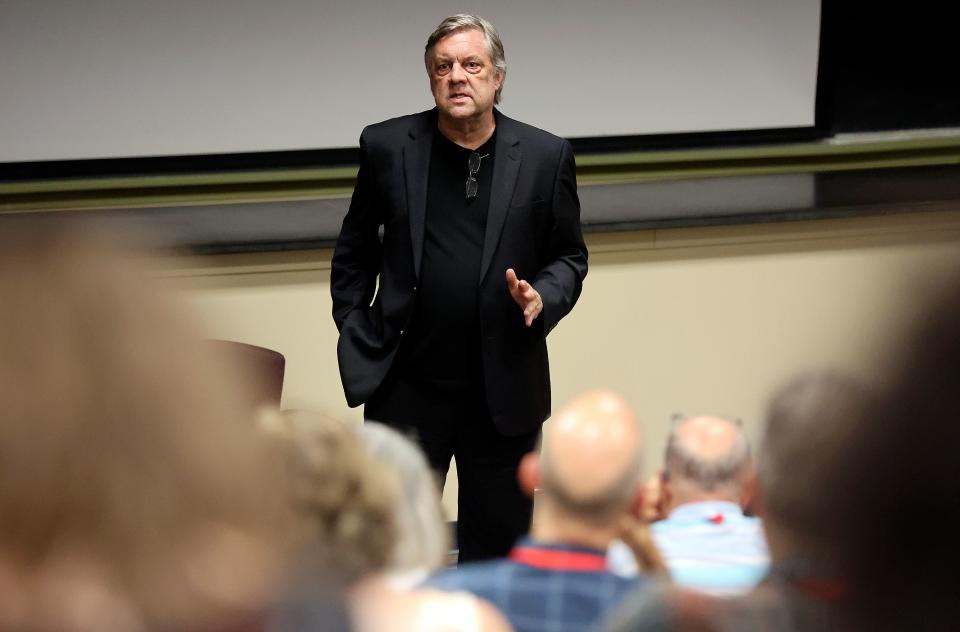Can America’s guardian Angel help save it?
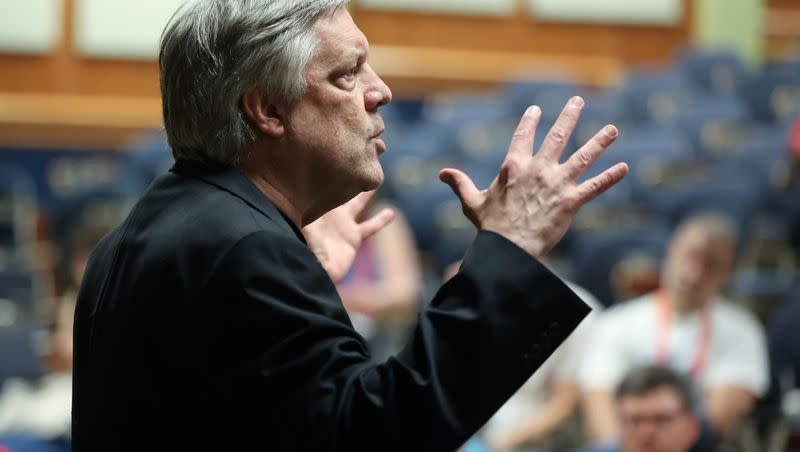
- Oops!Something went wrong.Please try again later.
- Oops!Something went wrong.Please try again later.
GETTYSBURG, PA. — No one knows precisely where Abraham Lincoln delivered the Gettysburg Address. Photographers at the time struggled so much with any motion that the handful of available pictures of the speech are too blurry to verify the location.
David Blankenhorn is explaining all this as he paces about the monument grounds dedicated to Lincoln’s famous speech at the Gettysburg National Cemetery.
He finally settles on a spot to plant his sturdy 6-foot-plus frame. He tosses back a flop of silver hair and launches into a near perfect, word-for-word recitation of the Gettysburg Address. Fittingly, his outfit, touched by droplets of summer rain, could be described as contemporary Lincoln — dark suit, no top hat, with unassuming oxfords and a pair of rimless reading glasses dangling from a simple black T-shirt.
Despite making his home in Manhattan, Blankenhorn’s storyteller drawl hints at southern roots; so, too, do the lengthy passages of William Faulkner he cites, making him one of Lincoln’s most curious living disciples. The name of the organization Blankenhorn founded, “Braver Angels,” is itself a twist on Lincoln’s first inaugural address.
“We are not enemies, but friends,” Lincoln said.
Then, in a declaration that could have been dismissed out of hand as delusional in that time, Lincoln said, “We must not be enemies. … The mystic chords of memory … will yet swell the chorus of the Union when again touched, as surely they will be, by the better angels of our nature.”
Whether Lincoln was asserting a thesis, a hope or a belief, Blankenhorn’s work may be seen as partial evidence that Lincoln was right. And while walking the grounds of the nation’s most visible memorial to the Civil War, Blankenhorn admits there is something about that heartbreaking moment in American history — the descent into the madness of fratricidal slaughter — and the president who helped the country transcend it, that hovers within his own identity.
In the introduction to his new book, “In Search of Braver Angels: Getting Along Together in Troubled Times,” Blankenhorn calls Lincoln a “constant companion” in his writing process — with Lincoln’s life offering “inexhaustible opportunities for learning,” navigating as he did through the “most horrible moments of mistrust and rancor in American history.”
We have come to Gettysburg this week to get a fresh pulse on arguably the nation’s largest grassroots movement aimed at reducing polarization. But we’re also here, 160 years after the battle of Gettysburg, to better understand the face of the movement and whether this man who has internalized the spirit of Lincoln can help America rediscover it.
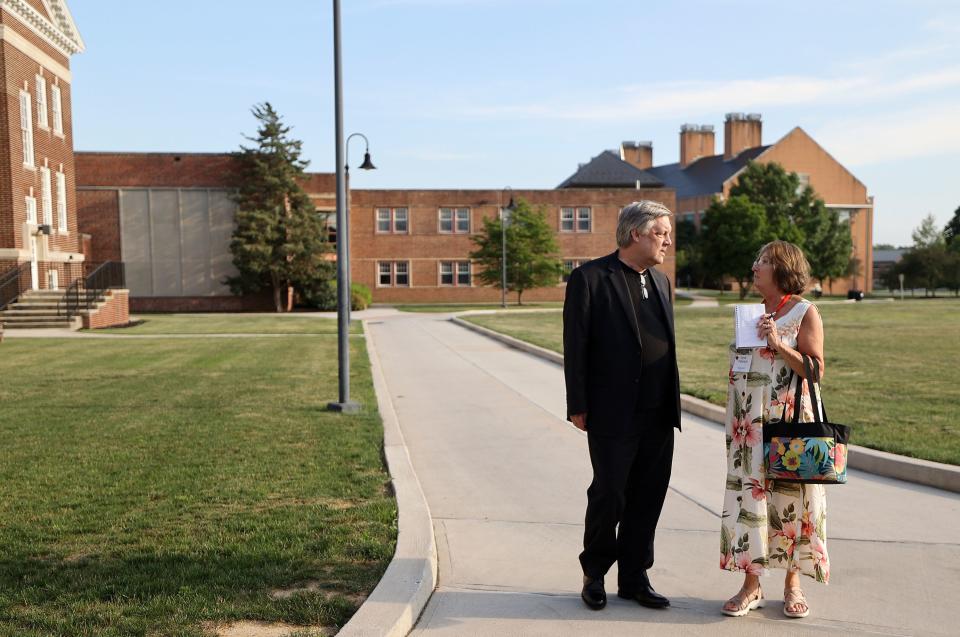
Mounting culture war
Almost to a person, the delegates at the national convention of Braver Angels sense something is rotten in the republic. Examinations across periods of American history started showing in 2016 the country was more polarized than perhaps any time outside the Civil War, with a troubling number of analysts comparing the period we’re in now to the 1850s, the decade preceding it. Polling last year by the Economist and YouGov found two-fifths of Americans believe a civil war is at least somewhat likely in the next 10 years.
In this sense, Blankenhorn’s interest in America’s Civil War may not be merely historical.
“Rancor has become the dominant feature of our public life,” Blankenhorn says during his speech opening the convention. “There’s a heart-sickness in the country, and we don’t really have to tell people there’s a problem, they all know it.”
But if the problem is intuitive, the solution is proving more elusive. For Braver Angels, an essential starting point is fostering space to hear different perspectives, living by the radical creed “There is no one not worth talking to.”
And Blankenhorn will talk to anyone.
After delivering his impromptu recitation of the Gettysburg Address, he ambles over to two leather-clad motorheads in town for a biker rally. Blankenhorn promises to hop on the back of their motorcycle if they’d be open to taking a break to visit his convention. The bikers, who are enjoying the repartee, explain that most folks who come to biker rallies support former President Donald Trump, but few ever discuss politics. When Blankenhorn pitches them on his mission of helping liberals and conservatives rediscover cross-party friendship, one says, “Sounds like a tough job.”
The passion of a lifetime
When David was 15 years old, he started a group called Mississippi Community Service Corps, which aimed to draw together Black and white students from recently desegregated Mississippi public schools for shared service projects. As Blankenhorn describes his story, his life has been a ministry of various kinds of bridge building: “Conservative and liberal. Black and white. South and North. Grassroots and elite. Father and child. A marriage. Scholars from divergent disciplines.”
To him, it’s “all been one thing.”
But his drive for peacemaking wasn’t easy. It was born through the bitter divisions over race in the South. In an interview with the Institute for Family Studies, he said he’s “always wanted to unite the moieties” and “prevent irrevocable fracturing.”
Years later, as culture wars metastasized and debates over marriage arose, Blankenhorn’s instinct once again kicked in. Organizing events bringing together people on either side of the issue, he sought to foster, at a minimum, mutual understanding.
“I have no stomach for what we often too glibly call ‘culture wars.’ ... I’m more interested in conciliation than in further fighting,” Blankenhorn wrote in The New York Times back in 2012. These conflicts — race, marriage, politics — formed a personal passion that has crystalized in recent years into a kind of vocation. In our conversation, Blankenhorn acknowledged that Braver Angels had antecedents in some of the difficult personal experiences navigating through the various “crucibles” of distinctly American conflicts.
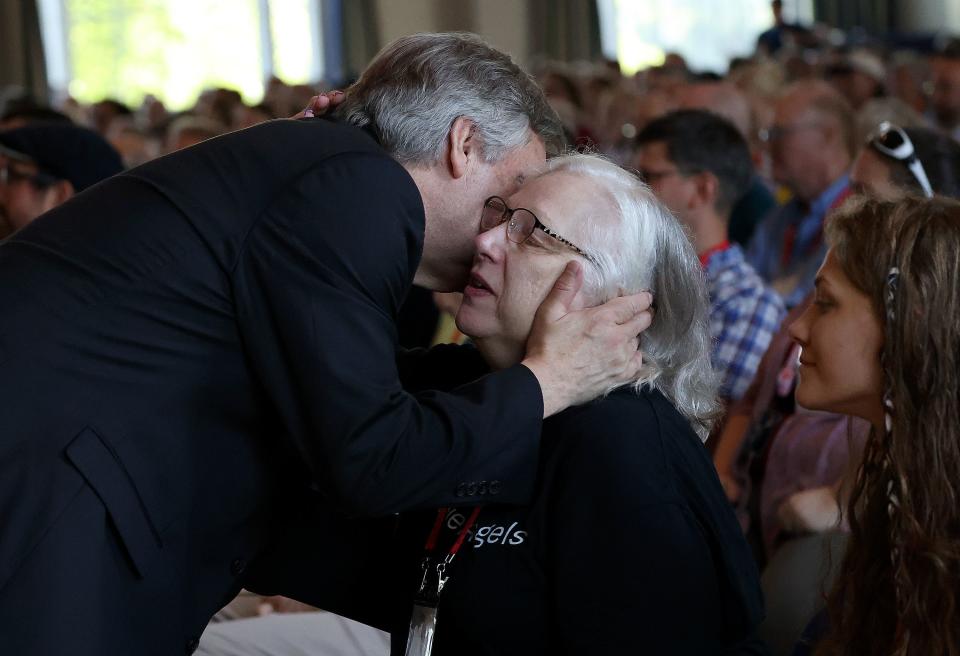
Humble origins
The organization was officially launched in a church basement in South Lebanon, Ohio, not long after the bitter 2016 presidential election. Twenty-two people were present: half Clinton voters and half Trump voters. As an experiment, those assembled spent a weekend trying to see if they could talk with each other rather than about each other.
“It was a magical thing — transformative for us,” Blankenhorn reflects.
Seven years later, nearly 700 people have come to Braver Angels’ national convention, and the organization has students active on 75 college campuses and 2,500 trained volunteers who Blankenhorn calls the “heart and soul of what we do.”
We spoke with Mary Beth Gilbert, a conservative from Texas, and Carol O’Neill, a liberal from New Jersey, about why they were here.
Gilbert said she never remembered such political rancor growing up, but now feels hesitant to tell people her political affiliation. O’Neill is likewise concerned about polarization nationwide, even while living in a red-blue marriage which, she says, smiling, “needless to say, comes with its challenges.”
Both women exhibited patriotic solidarity and enthusiasm to associate with political opposites through the convention. This isn’t an uncommon response to those who experience the program here, although we spoke to another delegate from Kentucky who was eager to demand more specifics from Braver Angels about their goals and aims.
While the growth of Braver Angels has been strong, questions linger about whether a relatively small leaven can help Americans rise above the rancor of yet another divisive election year.
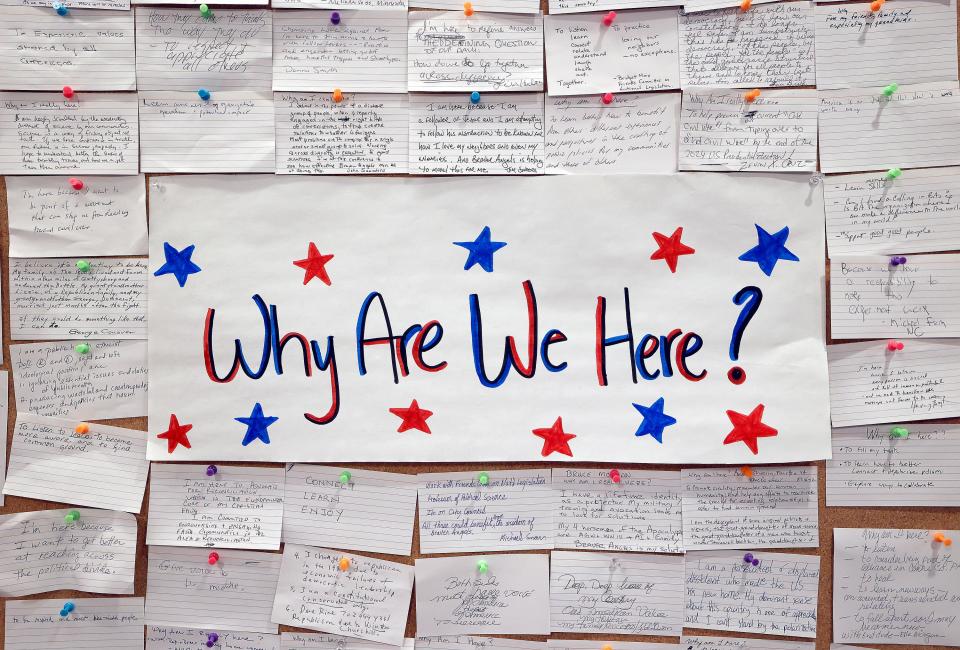
Laying the foundations of peace
It’s easy to think the answer to polarization is to run out and somehow “change Washington.” But one place where the work of peacemaking can begin is the same place conflict can sometimes start: right at home.
Blankenhorn’s earlier work focused on fatherhood and the lasting impact of early family experiences. When fundamental trust is disrupted in family relationships, trusting others later on becomes harder. Distrust, he says, often “begins close in and spreads from there.”
The importance of the family in larger society is still apparent in Braver Angels’ work today.
A family therapist, Bill Dougherty — along with a leadership team including John Wood Jr., Ciaran O’Connor, April Lawson, Donna Murphy and David Lapp — was central to the founding philosophy of Braver Angels, which now also includes politically balanced state co-chairs in its extended organizational structure.
With some Americans flirting with a “national divorce,” groups like Better Angels are performing a function in their communities that looks a lot like couple’s therapy.
Related
Family, of course, isn’t the only influence on polarization today. Trust in American institutions has eroded across the board, and Blankenhorn believes the media also plays an outsized role.
“Institutions that openly abandon professional standards as part of creating and profiting from polarization, such as most of today’s media. … These are hammer blows against soft wood,” Blankenhorn says.
One national expert on crime and drugs, Shima Baradaran Baughman, recently told the Deseret News she’s had numerous encounters with reporters interested in her views on a story. Yet when she offers a “more balanced story,” she said, sometimes they “don’t want to hear it.” This is driven, in her view, by a “system where the most extreme, the most negative gets the most exposure, and exposure is dollars and advertising.”
All this might help explain Blankenhorn’s fondness for singing the last, lesser known verse of “God Bless America” — “God shed His grace on thee, till selfish gain no longer strain the banner of the free” — and why Blankenhorn is convinced the peacemaking movement needs to come from the ground up, from ordinary people, rather than waiting for political leaders.
As he puts it, “My instinct … is that American elites today are too implicated in the structures and mindsets of polarization to do much to change it, unless they are awakened and guided by ‘We the People.’”
This is the place
When asked last year about examples of this awakening and places embodying the “possibilities for a less rancorous and more perfect American union,” Blankenhorn responded, “If you want examples of citizens overcoming divisiveness that often leaves the rest of us angry and demoralized, visit Utah.” He pointed to a series of recent compromises in the state on contentious political issues ranging from gay rights and religious freedom to immigration and refugees.
“I’m still trying to figure out what their secret is,” he added. “Utah is a very conservative state, reliably Republican in its voting patterns. But somehow, the people seem to be special. Open to hearing other points of view. Hospitable. Willing to compromise for the common good. Decent-minded.”
The Braver Angels ethos is to hope people can be decent-minded, wherever they live.
Which is why, as Braver Angels maintains, there is no one not worth talking to — whether a liberal from New Jersey or a conservative from Texas or a couple of bikers visiting Gettysburg 160 years after tens of thousands of Americans gave their last full measure of devotion so “government of the people” won’t “perish from the earth.”
